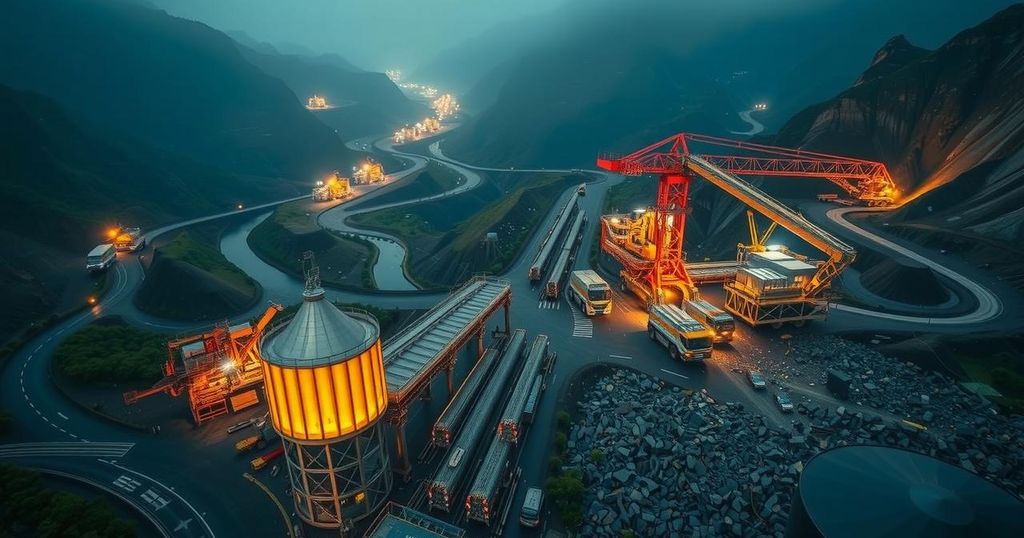Challenges of Illegal Gold Mining by Chinese Firms in Eastern DR Congo

The eastern DRC suffers from illegal gold mining operations primarily conducted by Chinese firms, which pollute local resources and evade legal oversight. Father Davide Marcheselli is among those advocating against these practices. In response, the South Kivu governor has implemented a ban on illegal mining and is attempting to enforce existing mining laws. However, local artisanal miners face difficulties competing against larger companies that illegally partner with them. The government is trying to curb black market activities but faces challenges in doing so effectively.
The eastern region of the Democratic Republic of Congo (DRC), particularly the town of Kamituga, faces significant challenges due to the operations of Chinese gold mining firms. Father Davide Marcheselli, an Italian priest, has been vocal in opposing the illegal mining activities conducted by these companies, which have been detrimental to the local environment and economy by polluting rivers and destroying agricultural land. Local authorities have reported that numerous foreign firms, chiefly Chinese-owned, are engaged in gold mining without the necessary permits or transparency regarding their profits. Community groups and church members in Kitutu have been prominent in their resistance to these powerful enterprises, which are often supported by influential figures in the region, including politicians and village leaders. In a recent development, South Kivu governor Jean-Jacques Purusi enacted a suspension on illegal mining in the province to ensure compliance with Congolese mining laws. This legislation requires companies to renew long-expired mining permits. Following this suspension, a surprising number of firms—540 instead of the anticipated 117—sought authorization to resume operations. In Kamituga, artisanal mining continues, with many local individuals working in open pits with minimal resources. The local miners, according to Felicien Mikalano, the president of an artisanal mining association, lack the financial and mechanical capabilities of the Chinese companies who partner with local cooperatives, purportedly to sidestep legal restrictions preventing foreign involvement in artisanal mining. Access to some mining sites is tightly controlled, and local officials struggle to monitor these operations effectively. There are concerns about the opacity of the gold trade, particularly with the produce being sold largely outside official channels, and the participation of Congolese traders in transporting gold to various locations, including Bukavu and beyond, potentially to evade state regulations. The Congolese government, in a bid to regulate the gold export market, conferred a monopoly over South Kivu’s gold exports to the state-owned company Primera Gold in December 2022. However, this initiative has not effectively reduced the black market volume or enhanced the government’s revenue from gold exports. In fact, while declared gold exports surged dramatically from 42 kilograms in 2022 to over five tons in 2023, Primera Gold has struggled with liquidity issues to purchase gold, leading to ongoing proactive black-market operations that evade the government’s grasp completely. Despite attempts to engage with the mining businesses, local officials, including Governor Purusi, report encountering barriers, as they are often redirected to unhelpful bureaucratic channels instead of receiving straightforward answers regarding the gold operations in their province.
The exploitation of natural resources in the Democratic Republic of Congo is a longstanding issue, particularly in the mineral-rich regions such as South Kivu. Gold mining activities, especially those involving foreign companies, have often occurred without proper oversight or adherence to local laws. Communities have suffered from environmental degradation and economic exploitation as large corporations, particularly from China, engage in illegal mining practices. These issues are exacerbated by the complex interplay of local governance, corruption, and the lack of resources for monitoring and enforcement.
In summary, the illegal gold mining activities in eastern DR Congo, particularly by Chinese firms, significantly impact local communities and the environment. While recent regulatory efforts by the government intend to address these practices, challenges remain due to the intricate networks of complicity among local authorities and mining companies. The ongoing struggle for transparency and fairness in the mining sector suggests that both local and national authorities must enhance their governance frameworks to protect both the environment and the rights of the local population.
Original Source: www.rfi.fr








